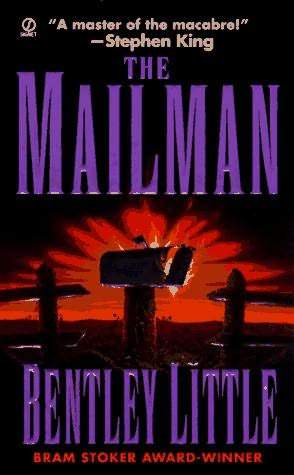 By BENTLEY LITTLE (Signet; 1991)
By BENTLEY LITTLE (Signet; 1991)
Make no mistake: THE MAILMAN is a bit of a misfire, but it’s also quite entertaining. It was the second novel by the talented Bentley Little, and evinces a lot of rookie mistakes, yet amply demonstrates Little’s genius for keeping the pages a-turning—it’s a mess, in other words, but while reading it you probably won’t much care.
The setting is a small Arizona town whose local mailman, beloved by most of the populace, has inexplicably committed suicide. His replacement is a creepy redhead who seems extremely committed to his job of delivering the mail. At first the town loves this new mailman, especially since he initially only delivers good letters, with the not-so-good deliveries—namely junk mail and bills—discreetly withheld.
But the bad stuff inevitably makes itself apparent, if not in the mail than the fact that peoples’ water and electricity are being turned off due to nonpayment of bills (obviously this novel was drafted before the rise of the internet). The town is hit with further unexpected suicides and letters that aren’t so nice, such as a series of missives from a man’s long-dead Nam vet brother promising to come home soon, and a woman’s deceased husband who sends her his severed appendages!
Clearly the mailman possesses wide-ranging supernatural abilities, although the author leaves them vague. So too the mailman’s intentions, which given the breadth of his powers and apparent ambition seem wasted on this sleepy Arizona town (if he’s as obsessed with doing evil as he seems to be, why doesn’t he take on New York or LA?).
The fable of Rumpelstiltskin appears to have been an influence on this novel (a pivotal sequence involves the hero surreptitiously catching the Mailman doing a freaky dance), as does Joan Sampson’s small-town horror classic THE AUCTIONEER and also THE TERMINATOR (as the mailman can’t seem to be killed). This makes for an overstuffed and oft-disjointed narrative that incorporates real-life horrors like workplace shootings, child abuse and of course bad postal service. Yes, it’s a gripping read, but I’d advise perusing nearly any one of Bentley Little’s twenty-plus other novels in its place.
